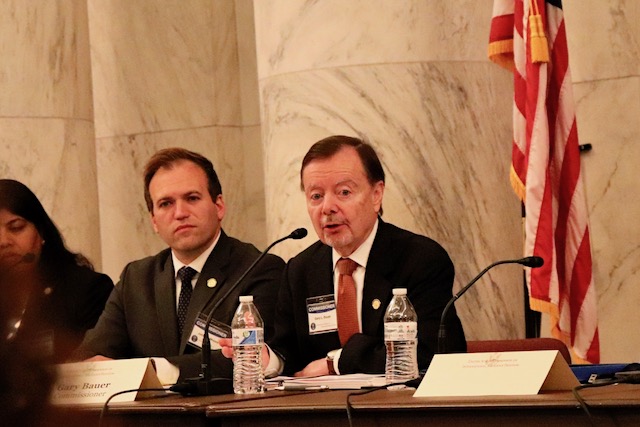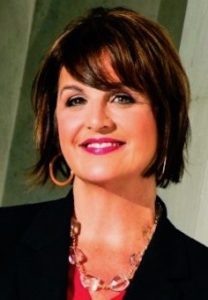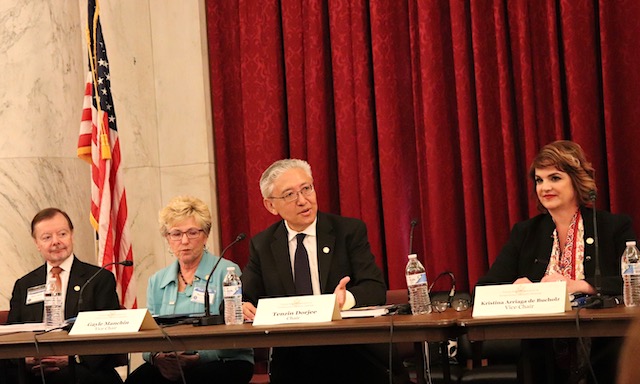Watchdog Group Boldly Calls Out 30 Nations As Worst Violators of Religious Freedom
A new bipartisan report names 30 nations driving “egregious” oppression of Christianity and other minority religions. China, North Korea, Russia and Saudi Arabia make the list.
On Monday, the U.S. Commission on International Religious Freedom (USCIRF) released its annual analysis of 30 nations committing the most egregious “religious-based discrimination, violence and persecution” worldwide.
Nine commissioners, appointed by both Democratic and Republican leaders, cast aside their differences to produce the 234-page report. Conservative leaders including Tony Perkins of Family Research Council and Nadine Maenza of Patriot Voices currently serve on USCIRF.
“This is an amazing moment here in Washington,” said Rep. Jim McGovern, D-Mass. “We’re all united in our belief that we need to uphold religious freedoms all over the world. We all have to speak up, and we all have to be vigilant.”
The report names 30 nations total. Sixteen are highlighted as of particular concern, including U.S. economic partners China, Russia and Saudi Arabia. The report is broader in scope than the annual ranking from Open Doors USA, which tracks persecution of Christians. USCIRF hosted a launch event Monday morning on Capitol Hill, featuring Q&A with media.
“We are meant to be disrupters,” said Kristina Arriaga, vice chair of USCIRF, in an interview. “It’s the only body of its kind in the world. Commissioners are unpaid volunteers who come from different religious backgrounds and different parties. We focus with laser-like intensity on religious freedom.”
“We stand united for religious freedom
We all have to speak up and be vigilant”@RepMcGovern (D-MA)@USCIRF Releases 2019 Annual Report & Recommendations for World’s Worst Violators of Religious FreedomPress release: https://t.co/Qd9ZTrdLmB
Full report: https://t.co/nX4WD9XRwH pic.twitter.com/ZjHDk5ErZI— Josh M Shepherd (@JoshMShep) April 29, 2019
The report release comes as USCIRF faces a critical test in Congress. Established in 1998, it must be reauthorized this year to continue its mission. Congressional leaders in both parties, including Rep. Mark Meadows, R-N. Carolina, emphasized they see it as a priority.
“You’ve now heard from a [moderate] Senator and a liberal Congressman,” said Meadows. “There are not too many people to my right — you’ve got the full spectrum! Many things could divide us, but this brings us together. Religious liberty is the hallmark of who we are.”
The Worst Violators: North Korea and China
USCIRF members called out nations of concern, at times bluntly. “North Korea and China are two of the worst actors in the global community,” said Perkins in an interview.
Gary Bauer, president of conservative advocacy group American Values, further exposed the world’s most populous nation. More than 1.4 billion people live in China.
“China [is] getting more and more powerful by the year,” said Bauer. “People in China working for the government are engaged in persecution, whether it’s of Muslim Uighurs, the Falun Gong, Tibetan Buddhists or Christians. The situation is getting worse.”
“To have a country with these ideas and this degree of persecution ought to be something that scares everyone.”
In November, underground church leader Bob Fu revealed how high-tech tools are being used to shut down churches and imprison Chinese believers.
“Trade with China was supposed to change China. It ended up [it] has changed America, as more corporations became dependent on the goodwill of the Chinese government.” – Gary Bauer
Meanwhile, North Korea has also not improved. More than 70,000 Christians are in forced labor camps in the totalitarian state, according to reports.
“North Korea remains a very troubling and repressive regime,” said Perkins. “It’s uncertain where the talks are going between North Korea and the U.S. Some hoped those conversations would lead to greater awareness and understanding to restrain their human rights abuses. We’re not seeing that right now.”
Bauer denounced U.S. corporate complicity with China, accusations that have hounded Google, Apple and Cisco for years.
“Trade with China was supposed to change China,” said Bauer. “It ended up [it] has changed America, as more and more corporations became dependent on the goodwill of the Chinese government. I will personally say: Shame on you!
“[You] were founded in a country built on religious liberty,” he added. “How dare you make a separate peace with the Chinese government in order to advance your financial interests!”

On April 29, 2019, members of the U.S. Commission on International Religious Freedom (USCIRF) present the findings of their 2019 Annual Report at a Capitol Hill event. R-L: Gary Bauer, Johnnie Moore, Anurima Bhargava.
Rising Threats, Glimmers of Progress
Other U.S. diplomatic partners also come under scrutiny in the report, notably Russia.

Kristina Arriaga
“In Russia, nationalism has become the only allowed religion in the state,” said Kristina Arriaga of the independent watchdog group.
“Even though the Russian Orthodox Church has a presence there, it is very clear the Russian government wants to restrict religion. If rights do not come from the state, as many religions assert, the state cannot take them away. Russia does not tolerate such believers.”
Hunger and lack of basic resources continue to plague the former Soviet Union, even as its repression of believers persists.
“Russia’s actions make a mockery of how they claim to respect religious freedom,” concluded Arriaga.
In the Middle East, Iraq faces its own struggles with infrastructure. After ISIS militants ravaged the nation, it will take years to rebuild — with the threat of extremism still on the horizon.
“Social, religious and ideological dynamics that led to the rise of ISIS are really complex,” said Nadine Maenza. “The Iraqi government is not bringing people together to try to stop sectarian divisions. We’re concerned it’s going to continue unless they take a more proactive role.”
Bordering Iraq to the west, Syria has some recent promising developments despite its years of violent civil war.
“In northeast Syria, an independent government has come together that is a true democracy,” said Perkins. “Yazidis, Christians and Muslims are living, working, governing and pursuing religious freedom together. It’s one to watch.
“I am so thankful that the Trump administration did not pull all of our troops out of that region to protect that budding tree of liberty that has taken root there in Syria.”
Unique Mission, Unflinching Honesty

Tony Perkins
A prominent voice on the White House Faith Leaders Initiative, Perkins addressed a question he often fields. Specifically, how do Christians have common cause with believers of other faiths?
“God is all about people having a choice,” said Perkins. “Everyone should have the freedom of religion — to believe or not to believe.
“It’s the one point that brings this diverse commission together,” he added. “What we’re seeing increasingly is certain governments are restricting that freedom.”
His longtime friend Rep. Meadows spoke of his deeper involvement with USCIRF over the past year. The North Carolina Congressman advocated publicly for Pastor Andrew Brunson, whose family lives in his district.
This past October, Turkey released Brunson after USCIRF’s years-long advocacy for the prisoner of conscience.
“This commission has been willing to stand up on behalf of those who do not have a voice,” said Meadows. “This should be a priority for Americans broadly, from coast to coast — from Maine to California, from Montana to Florida.”
“It’s critical that Congress comes behind you and supports you in a long-term way,” he added.
“We are meant to be disrupters at USCIRF. It’s the only body of its kind in the world.”
Johnnie Moore, an author and PR professional appointed to USCIRF by President Trump, noted other positive results. Iran, Pakistan and Turkey have recently released prisoners of conscience following pressure from the watchdog group, he said.
“Look at the small budget of USCIRF compared to the countless millions of dollars the federal government spends on all kinds of different areas,” said Moore.
“I can’t think of a program that has done more to strengthen our government’s focus on its values and to improve conditions around the world.”

On April 29, 2019, members of the U.S. Commission on International Religious Freedom (USCIRF) present the findings of their 2019 Annual Report at a Capitol Hill event. L-R: Gary Bauer, Vice Chair Gayle Manchin, Chair Tenzin Dorjee, Vice Chair Kristina Arriaga.
On the Horizon for Religious Freedom
While independent of the Executive Branch, USCIRF reinforces the U.S. State Department’s commitment to religious freedom.
Secretary of State Mike Pompeo has slated the second annual Ministerial to Advance Religious Freedom for July 16-18, to build on last year’s successful summit.
USCIRF members stated that their work differs from the State Department in its purpose and scope.
“People who think there is duplication do not have the full context,” said Moore. “State reports go through layers and layers of approval. It has a political interest according to American foreign policy. We at USCIRF only have one issue that we are assigned to watch and make recommendations to improve.”
Arriaga ticks off several positive outcomes from USCIRF, sure to be repeated in coming months as Congress debates the group’s funding. She underlines how their specific policy proposals to Congress and the President for each of the 30 nations make a difference.
“USCIRF looks at policies that have and have not worked,” she said. “Whereas State reports on over 190 countries, we focus on a limited number. Our recommendations reflect a greater depth.”
To close his remarks, Bauer brought into focus the purpose of their collective work.
“It’s the right of every man and woman in China — or wherever they are — to seek God and worship God as they see fit,” he said.
Watch the video below for insights on international religious freedom. Explore The Stream’s complete global coverage, and sign up to receive top stories every week.







